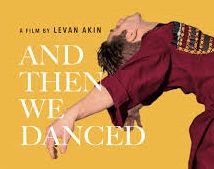Georgian far right threatens home premiere of hit gay movie

After winning accolades abroad, a Georgian movie about gay love is drawing threats at home, with far-right groups threatening to block Friday's premiere in the conservative Caucasian nation.
"And Then We Danced", a joint Swedish, Georgian and French production, tells the story of Merab, a young dancer with a traditional Georgian ballet company who falls in love with fellow dancer and rival Irakli. "The film is about finding your own place in a culture that doesn't want to accept you," director Levan Akin told the Thomson Reuters Foundation by phone, describing the picture as a "love letter" to Georgia and its traditions.
"It is absurd that people who bought tickets need to be brave and risk getting harassed or even assaulted just for going to see a film," the 39-year-old who was born in Sweden to parents of Georgian descent added in a social media post. The movie premiered at Cannes in France in May and has since bagged awards at film festivals around the world, including Chicago, Sarajevo, and Odessa, with Sweden selecting it as its official entry for the Oscars next year.
But the reception has been mixed in the ex-Soviet state of Georgia, where same-sex relationships remain largely taboo and where dance is revered as part of the nation's heritage. While tickets for the scheduled three days of screenings at a handful of cinemas in Tbilisi and the port city of Batumi sold out quickly, the influential Orthodox Church denounced the film as an attempt to undermine Christian values and legalize "sin".
"We find it unacceptable to see such a movie in movie theatres," the Georgian Orthodox Church said in a statement. Earlier this week, ultra-nationalist groups and anti-LGBT+ campaigners threatened to disrupt showings and block filmgoers from watching what they described as "gay propaganda".
Georgia has witnessed a cultural clash between liberal forces and religious conservatives over the past decade, as it has modernised and introduced radical reforms. It has passed anti-discrimination laws in an effort to move closer to the European Union, but homophobia remains widespread, LGBT+ rights groups have said.
In July, a small group of LGBT+ campaigners held a short Pride march in Tbilisi - a first for Georgia - despite threats by homophobic groups to attack the gathering. In 2013, a rally against homophobia was broken up by a crowd of priests and thousands of protesters, forcing participants to flee - a confrontation that Akin said had inspired his movie.
Gvantsa Garmelia, marketing director at Tbilisi cinema chain Cavea, said the company, along with authorities, was taking extra security measures. "We knew this would be (a) polarising topic, especially for radical parts of (the) Tbilisi population," she said. "We were hoping that our society had grown more tolerant and open to diversity."
On Tuesday, a coalition of Georgian civil society groups called on the government to condemn the threats and deploy security forces outside movie theatres. The interior minister urged everyone to abide by the law.
"The Ministry of the Interior ensures the protection of public safety and law, as well as the freedom of expression," it said in a statement. "The police will act within their mandate and any violations will be immediately prevented." But activists said protests were only going to increase public interest in a movie that could help change perceptions.
"We are living in the 21st century, you cannot block movie screenings. Even if you block the cinema, there is internet," said Tbilisi Pride organiser Giorgi Tabagari. "The whole country is going to watch this".
Also Read: UPDATE 1-Georgia's supreme court halts execution for man convicted of killing store clerk
(This story has not been edited by Devdiscourse staff and is auto-generated from a syndicated feed.)
ALSO READ
With tears, a crowd of South Koreans bids farewell to beloved panda before her departure to China
Protesters seeking hostages' release smear paint in Israeli parliament
Crowds picnic to see Tokyo's cherry blossoms at full bloom
China's crowded wine market offers no lifeline for struggling global industry
Crowds gather to watch cherry blossoms at peak bloom in Tokyo










